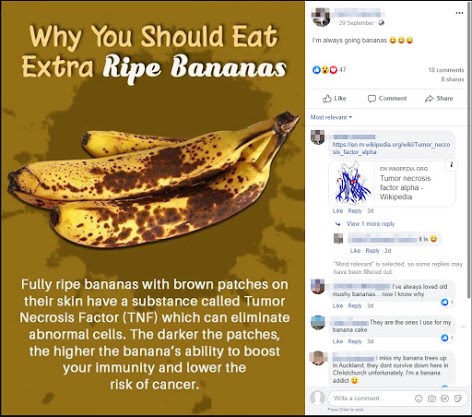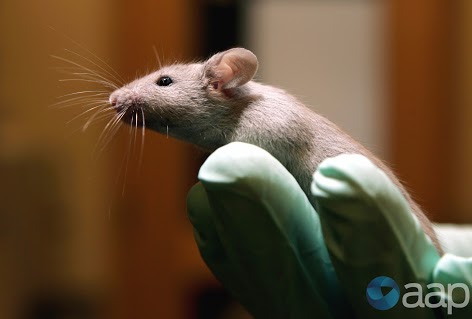The Statement
AAP FactCheck examined a Facebook post from September 29, 2019 by an Australian user which shows a bunch of ripe bananas and a caption above reading, “Why You Should Eat Extra Ripe Bananas”.

The caption below the image states: “Fully ripe bananas with brown patches on their skin have a substance called Tumor Necrosis Factor (TNF) which can eliminate abnormal cells. The darker the patches, the higher the banana’s ability to boost your immunity and lower the risk of cancer”.
Different versions of the post have been shared widely online, including here, here and here.
The Analysis
In 2009, Japanese researchers Haruyo Iwasawa and Masatoshi Yamazaki published a study on research that examined the effects of bananas on the body’s ability to produce an immune response.
The researchers used bananas of different varieties and varying degrees of ripeness. Their study involved injecting mice’s bodies with a solution containing mashed ripe bananas and feeding banana juice to the rodents and monitoring the responses. Iwasawa and Yamazaki measured how the mice’s bodies produced immune responses, including the production of a substance called Tumour Necrosis Factor (TNF). TNF is a protein made by white blood cells that may have roles in promoting or reducing the development of cancers. A form of TNF is also a contributing factor in some inflammatory conditions such as Crohn’s Disease.

The Iawasawa-Yamazaki study made no reference to bananas containing TNF and did not make any findings about any relationship between TNF and cancer.
Clare Hughes, chair of the Cancer Council Australia’s Nutrition and Physical Activity Committee, advised AAP FactCheck “the myth that a compound in overripe banana skins can cure cancer has been circulating for some time”.
“There is no evidence that any single food or special diet can cure cancer,” she said.
The Cancer Council is a charity in Australia “working across every area of every cancer, from research to prevention and support”.
Associate Professor Darren Saunders, a cancer biologist at the School of Medical Sciences at the University of New South Wales, told AAP FactCheck that he was not aware of any evidence that TNF is found in banana skin.
“Banana plants don’t even have the gene for making TNF,” Dr Saunders said.
In 2018, science communicator and journalist Tanya Ha wrote an article for the ABC about dealing with false online claims, including the claim that eating bananas with brown spots could cure cancer, and how it affected her and her family and friends who were diagnosed with cancer.
Ms Ha mentioned the banana meme and the Japanese mice study in the article, writing, “the scientists made no claim that the bananas produced the factor, or that they’d found a cancer cure. At best, the meme is gross misrepresentation of clinically insignificant research”.
The Verdict
Based on the evidence, AAP FactCheck found the Facebook post to be false. Bananas do not contain Tumour Necrosis Factor, which is produced within the body as part of an immune response.
- False – The primary claim of the content is factually inaccurate.
First published October 2, 2019, 19:20 AEST

















